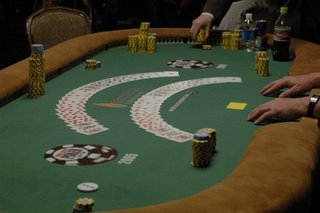
Will it happen any time soon?
Greg Abbott, State Attorney General of Texas, issued an opinion nearly a year ago on June 20, 2005 regarding the legality of playing poker tournaments in bars and restaurants. The opinion was prompted by a letter from the Ector County District Attorney, John W. Smith, requesting the Attorney General’s opinion on the legality of playing poker tournaments in two distinctly different scenarios.
In the first scenario, a bar hosts a poker tournament in which all of the entrants pay an entry fee or buy in. The fee being of equal or greater value than $25, is pooled and then divided among the winning entries; be it 3, 5, 7 or whatever, depending upon the total number of entrants. In other words, you pay $25, which goes into the pot to be won by the top 3 or more. In this scenario, the bar or house does not remove any money from the pot – every dollar which was paid in is paid out to the winners. Is it legal?
No. Why? Because, the bar would be operating a gambling place according to the opinion, in which players are placing a bet on a game in which the outcome is determined by chance or at least partially by chance (until proven otherwise).
How about scenario 2? In this scenario, the same bar hosts a poker tournament in which the entrants do not pay anything. It costs nothing to enter. It’s free. The tournament maybe a one time tournament or a progressive one in which the winners of each qualifying tournament earn seats into a final tournament. In either case, winners receive gifts of varying value. It could be a t-shirt; it could be a gift certificate. In a progressive tournament, the overall winner could win a seat into a major tournament event such as the WSOP. Is it legal?
Yes. Why? Because the bar operators are not operating a gambling place since the entrants did not bet anything (entry was free!) and therefore were not gambling.
Alright! We can legally play in free bar tournaments.
This opinion is a good thing for poker as an industry in Texas. These free tournaments introduce many players to the joys of playing poker for only a little investment of time. It is a breeding ground for new players when you think about it. It’s a great way to learn how to play, have fun, maybe win a prize, and you can’t lose anything. Even well experienced players enjoy playing them because it’s an easy way to try and win prizes as one might feel their skill and experience will give them the edge to beat out their novice opponents.
The opinion however would seem to seal the fate of buy-in tournaments in a public place in which players can win money. The same is likely true for ring games. Although the opinion does not directly address ring or cash games, one might figure that if an entry fee into a tournament is considered a bet, so would the buy-in to a ring game.
Has anyone in this state taken a look around? Poker is everywhere. Competitive LEGAL poker is being played all around Texas. Oklahoma, New Mexico, Louisiana, and now Mexico have legal competitive poker being played for money. Yet Texas remains staunchly committed to stand up against the evils all around our borders. Texas is a state of high moral fiber, devoutly religious, and considers gambling to be wrong, immoral, and sinful.
Well, except horse racing. We’ll let you do a little betting on the track. But there can only be so many tracks allowed. We don’t want them all over the place you know.
Oh, and we do have a heart, so you can spend all you want on a chance to win those money prizes at your local charity bingo hall.
What’s that? The lottery? Well, yeah; I forgot, we have one of those too, with scratch off tickets available also. In fact, we know poker is so popular; we named one of our scratch ticket games after the popular game Texas Holdem. The TEXAS lottery – TEXAS Holdem; see the similarities? It’s almost as if the poker game was named after our State! Besides, you can’t loose your house playing those. I mean they are only a dollar or two, right?
I still am trying to figure what it is about gambling that is so immoral.
Is it because it is immoral to win something for nothing based on a game in which the outcome is determined by chance, or at least is determined partially by chance? Wait, that can’t be defined as gambling because you didn’t make a bet if it was for nothing. See the Attorney General of Texas opinion, previously mentioned.
Maybe we don’t allow gambling because it is immoral to make a wager to win more than what you wagered on a game in which the outcome is determined by chance, or at least is determined partially by chance. No, that can’t be immoral. Otherwise, all of our churches who have bingo halls would be doing something immoral and we know that isn’t the case. Otherwise, we would then have to classify bingo as a game of skill with no possibility of chance determining the outcome.
Perhaps it is because it is immoral to make a profit from operating a game in which money lost on the outcome of a game that is determined by chance, or is at least partially determined by chance. In other words, it’s immoral to make a profit from the loses of participants for hosting or providing the opportunity for such a game to take place, regardless if the profit was made directly or indirectly from the game. That’s it, the profits are immoral.
OK, let me get this straight, if you make a profit off of operating or providing the opportunity for gambling to take place it’s immoral, UNLESS we call the profits charity or taxes, in which case everything is ok.
Isn’t all of this just so very silly?
Will poker ever be legal to play in public card rooms in Texas similar to other states? Not as long as we fight over whether poker is a game of chance or a game of skill. I personally think it is a game of chance played with skill. What does that mean? It means that a skilled player can use the tools of the game more effectively to gain advantage and win than a player who is not as skilled in the same situations.
Skill or chance, who cares? Defining poker as a skilled game will never happen. So it isn’t even worth anyone’s time in trying to do so.
The only way to get legal public card rooms in Texas is to change the law. Let’s do a little education. Remember school house rock? http://www.school-house-rock.com/Bill.html

The law which needs to be changed is part of the Texas Constitution. The Texas Constitution is not an easy document to change. The process goes something like this:
Someone writes a bill which hopefully becomes law one day. A State Senator can sponsor a bill to the Senate. Likewise, a State Congressman can sponsor a bill to the House of Representatives.
Once the bill is submitted, it goes to committee. A committee is made up of legislators who then decide if a bill is worthy of being sent to the floor for a vote. They can edit the bill, send it back to be re-written, or submit it to the floor. Most bills die in committee. The floor could send it back to committee or vote to pass it or kill it. If they vote to pass it, it gets sent to the other house for consideration and goes through a similar committee process. Once a bill is approved by both houses, it goes to the Governor for signing. There are time constraints all along the way. For example, the Governor has 10 days to sign it. He can either veto it, or not sign it. In either case, it would go back to the Legislature which would require a 2/3 majority vote to override the veto. After all of that, it goes to the people to vote on.
I have left out a lot of details to simplify the process. Even still, you can see that to change the law will require a monumental effort. Can it be done? Yes, but not likely in the next session, and perhaps not in the session after that. Why?
Because our legislators believe that the voting public does not want poker to be legalized. Did you read that last line correctly? I didn’t say the public, I said the VOTING public. Are you registered to vote?
Poker players tend to be very passionate people, especially when it comes to poker. But the truth is, most of them aren’t even registered to vote. If all of the poker players united, under one voice or organization, donated tax deductible money to the organization to generate the funds to hire lobbyists, and more importantly, these players were ALL registered to vote, we could change things.
The organization would give the players an orchestrated voice, the direction to move as an organized body. However, it is the individual REGISTERED players who would have the most influence.
If every Texas resident poker player did these four things:
1. REGISTER TO VOTE!
2. Write or call your legislator and told them you want them to legalize poker.
3. Tell your legislators that to receive your vote for their re-election depends on them voting for pro-poker legislation.
4. Join a common organization who’s fundamental purpose is to legalize poker in Texas.
We could legalize poker in Texas.
I had mentioned in a previous post a few organizations that were working on this endeavor of legalizing poker in Texas. The first was Texans for Poker. The organization floundered and I believe it is now defunct. The second is the Texas Card Players Association. (Website still under construction.) This group formed last fall and have only just elected a board of directors. Lastly, there is the Texas Poker PAC. They have partnered with the TCPA in a joint effort to legalize poker. These two organizations are still somewhat in their infancy. Considering the TCPA formed nearly 9 months ago shows slow progress, but progress none the less. While I am hopeful that they will champion the cause, I am cautiously hopeful.
In the mean time, if you are a poker player who is not registered to vote you can help out immediately by going and getting registered. And don’t give the excuse that you don’t want to register because you will get snagged for jury duty! The truth is that you can get snagged for jury duty even if you aren’t registered to vote.
We all need to band together to even have a chance to force change!



1 comment:
There is also anoter PAC, Texas Association of Poker Players:
http://www.txassociationofpokerplayers.com
Post a Comment